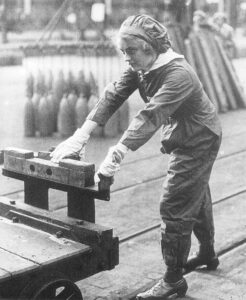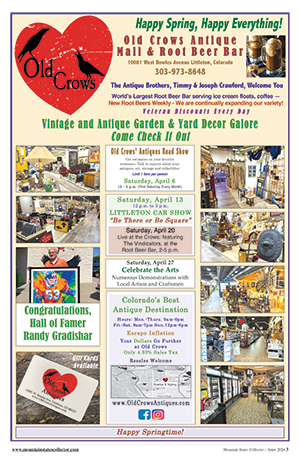 By Barry Krause
By Barry Krause Women workers in the British munitions factories in World War I were nicknamed “canaries” because the high explosive chemical they used to fill shells was trinitrotoluene (TNT) which turned their faces bright yellow, and made their hair a bright ginger color. The color wouldn’t wash off, but it wore off gradually if they quit munitions work.
A wonderful book of eyewitness accounts of people’s experiences in World War I was republished, The Imperial War Museum Book of The First World War by Malcolm Brown, reissued by Pan Books in London, England, with 288 hardbound pages and a recommended retail price of 25 British Pounds.
I’ve read a lot of books about World War I, but this book is one of the most “readable” and dramatic in its expert presentation of information through the eyes of people who actually saw battle or served in support work for soldiers at the front.
For example, this book tells us that the “canaries” had no effective disguise. They stood out for all to notice when going to or from work. Caroline Rennles, who was employed at the famous Woolwich Arsenal, describes her train trip between her home and work:
“Sometimes the trains were packed, so of course the porters knew that we were all munition kids, and they’d say, ‘Go on, girl, ‘op in there,’ and they would open first-class carriages. And there’d be officers sitting there and some of them used to look at us as if we were insects… Of course the conductors used to say on the trains ‘You’ll die in two years’… So we said, ‘We don’t mind dying for our country.’ We were so young we didn’t realize. I was very patriotic in the First World War, everybody was. If you saw a chap out in the street you’d say, ‘Why aren’t you in the army?’” Worker discipline had to be strict in the munitions factories because one mistake could create a devastating explosion. Smoking was absolutely forbidden, as was the carrying of matches or anything made of metal in the work rooms. The girls weren’t allowed to talk to each other while they worked, so that they could concentrate on their dangerous repetitive tasks.
Lilian Miles describes an incident at her munitions factory in Coventry where a friend of hers forgot to remove a match from her pocket before coming to work:
“She went to pullout her handkerchief and out flew this match. And, of course, the foremistress saw it… I tried to tell them it was quite accidental… but they said it didn’t matter what I said, and … they took her away to prison, to Winston Green. And she never got over it. Within a few months she died. She was twenty years of age.”
The same politicians who sent endless regiments of young men to die in four years of the stalemate nightmare of trench warfare in World War I also made young women work in often atrocious conditions and risk their lives in the munitions factories.
Gabrielle West worked at a factory in Pembury, South Wales, where she witnessed these working conditions for the girls:
“The change rooms are fearfully crowded, long troughs are provided instead of wash basins, and there is always a scarcity of soap and towels. The girls’ danger clothes are often horribly dirty and in rags… Although the fumes often mean sixteen or eighteen casualties a night, there are only four beds in the surgery… There were until recently no lights in the lavatories, and as these same lavatories are generally full of rats and often very dirty the girls are afraid to go in.”
There were serious accidents at times. Gabrielle West describes one such disaster at her factory:
“At about 6 o’clock there was a tremendous explosion and then a whole succession of little bangs. I rushed upstairs and from the window saw flames and smoke coming from the factory in volumes. The landlady wept and flapped and said poor Miss Buckpitt was no doubt already dead, and all the poor dear girls blown to atoms…”
In my opinion, if politicians had to go fight wars and put their families in hazardous munitions factories where they order strangers to work, there would be no more wars. I have no respect for armchair generals in World War I or any other war.
The “canaries” were also known as “munitionettes” in Britain, a reference to the then militant “suffragettes” who were fighting to get women the right to vote. Women in many countries, including Great Britain and the United states, did not achieve full voting rights in their political elections until after World War I ended, and many women in the world still can’t legally vote.
Our “forgotten heroes” of war include munitions workers who often risk their lives just as much as the soldiers on the battlefield.
Seeking something new to collect in the line of wartime memorabilia? How about anything connected with the World War I “canaries?” Their letters, diaries and memoirs are obvious collectibles, but don’t forget vintage photos of them in their factory work garb or the actual clothing or tools they used at the munitions factory, if you’re lucky enough to find them for sale and can recognize them for the historical artifacts that they truly are.
Caption: A woman munitions worker in Britain’s largest shell-filling factory during World War I at Chilwell, Nottinghamshire. One of the many dramatic photos in the excellent republished volume of “The Imperial War Museum Book of The First World War.”















Follow Us